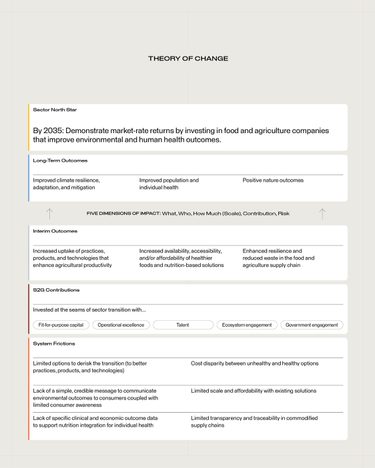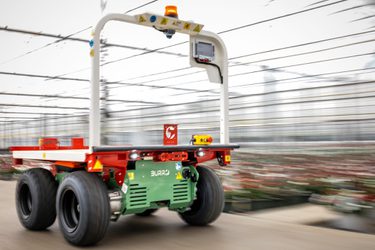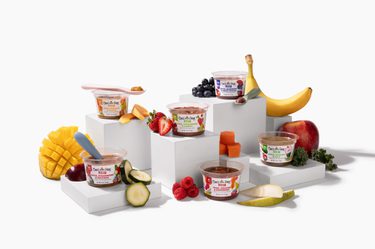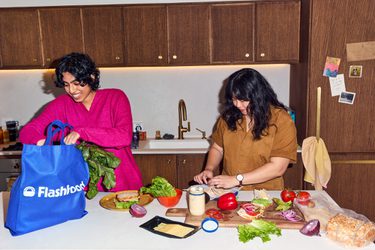
Our Food & Agriculture North Star: Improved Environmental and Human Health Outcomes



In light of shifting consumer preferences, the depletion of national resources and increased occurrence of extreme weather events, we believe those who grow our food have a need for innovation and cost-effective solutions. S2G sees a powerful opportunity to create long-term value by investing in the transition to a food system that improves health outcomes, supports farmers, and strengthens ecological resilience.
Our approach is grounded in a systems-level view of the grower-to-grocer ecosystem. By investing across the entire value chain – from on-farm technologies and ingredient innovation to food retail and consumer products – we seek to help bridge gaps between siloed actors and integrated scalable solutions. This enables us to tackle cost disparities, scalability issues, and risk barriers simultaneously.
In 2024, our team deployed over $215 million and invested in two new portfolio companies, Exacto and Sunday Lawn Care. We are excited to support over 65 portfolio companies across the food and agriculture value chain since our start eleven years ago.
To build on our momentum and further our efforts to invest in innovation, we have introduced our Food & Agriculture Theory of Change, a framework that seeks to guide new investments and map our portfolio to a shared “North Star” goal.1
Sector North Star
By 2035: Demonstrate market-rate returns by investing in food & agriculture companies that improve environmental and human health outcomes.

Our food & agriculture interim outcomes align with long-term outcomes that support S2G’s overarching Theory of Change. The following case studies illustrate how portfolio companies are contributing to these interim outcomes as measured through defined impact indicators.2

Increased Uptake of Practices, Products, and Technologies That Enhance Agricultural Productivity
Case Study: Burro
500+ autonomous robots deployed, amplifying workforces all over the world.3
Burro is deploying autonomous, AI-powered robots that work alongside people to tackle labor-intensive tasks on farms and nurseries. These collaborative robots use advanced computer vision, high-precision GPS, and machine learning to navigate dynamic outdoor environments, carrying and towing harvested produce to collection points without requiring human guidance. By automating repetitive and physically demanding activities, Burro enables farmers to reduce labor dependence, boost efficiency, and streamline workflows. The robots are designed to integrate seamlessly into existing operations, requiring no central command or added infrastructure. With the ability to collaborate not only with human workers but also with fellow Burros through intelligent traffic management software, these mobile units are redefining teamwork and safety in agriculture. Building on this foundation, Burro is growing beyond agriculture, scaling its robots and OS to enable autonomous outdoor work across multiple labor-intensive industries.

Increased Availability, Accessibility, and/or Affordability of Healthier Foods and Nutrition-Based Solutions
Case Study: Once Upon a Farm
1,275,920 nutritious meals delivered to children in food insecure communities through its Save the Children Partnership.4
Once Upon a Farm is a childhood nutrition company offering organic, cold-pressed meals and snacks for babies through big kids, with a mission to make high-quality nutrition more accessible to all families. By gaining authorization from the Women, Infants, and Children (WIC™) program in 18 states, the company is increasing affordability and access to healthier food options in underserved communities. To further advance this mission, Once Upon a Farm launched its A Million Meals program with Save the Children, aiming to provide 1,000,000 nutritious meals to kids in food-insecure communities by the end of 2025. Through this multi-year partnership and their growing retail presence, the company is helping displace overly processed foods with clean-label alternatives and creating a more inclusive, equitable food system.

Enhanced Resilience and Reduced Waste in the Food & Agriculture Supply Chain
Case Study: Flashfood
32M+ pounds of food diverted from landfills in 2024.5
Flashfood is a digital marketplace that connects consumers with grocers offering surplus fresh food at up to 50% off. By turning potential food waste into opportunity, Flashfood helps retailers minimize losses and attract new customers, while giving families affordable access to nutritious groceries. Its seamless integration into store operations, flexible deployment model, and user-friendly app make it easy to scale across diverse retail environments. With over 1,900 store partners in the U.S. and Canada, including Meijer and Loblaws, Flashfood is diverting food from landfills while helping grocers build customer loyalty and gain real-time insights into shopping behavior and demand trends.
We are grateful to our portfolio companies, co-investors, and broader ecosystem for engaging with us in this work. By learning from one another and aligning around common goals, we believe we can strengthen the practice of investing in resilient, lasting businesses.
For more details on our North Stars, download S2G’s Annual Report.
Learn about our Energy North Stars.
Learn about our Oceans North Stars.



